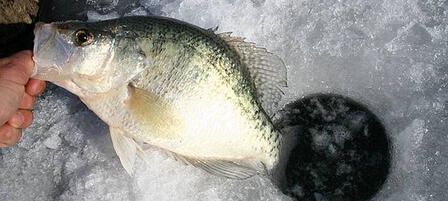Frozen Lakes Require Caution

PRATT – It’s been several years since Kansas has experienced prolonged deep-freeze weather, and you can bet anglers who love to icefish are anxious to give it a try. However, anyone planning to venture out on a frozen lake should refresh themselves with ice safety rules.
The first rule is to wait for at least 4 inches of clear, hard ice before walking on any ice-covered waterbody, and 5-7 inches of ice is necessary to support a snowmobile or all-terrain vehicle (ATV). It usually takes several days of calm weather with single-digit temperatures to make safe ice, and the only way to measure ice thickness is to make test holes as you go.
The appearance of the ice can give clues to its integrity. New, clear ice is the strongest. White ice may only be about half as strong. Warm, sunny days can melt the surface and “honeycomb” the ice, which will weaken it, as well. Also be aware that temperature, snow cover, currents, springs and even roosting geese can affect the strength and safety of ice. Never take ice strength and thickness for granted. Continually check the ice when moving to new areas.
Other safety considerations include fishing with friends, and packing a rope, ice handpicks, and a throwable floatation device with your gear. And ice cleats make walking on smooth ice easy and much safer. It’s best to use an auger to cut holes, which in Kansas must be no more than 12 inches in diameter.
Motorized electric or gasoline-powered ATVs, work-site utility vehicles, golf carts and snowmobiles may be operated on ice-covered department waters only for the purpose of icefishing from one-half hour before sunrise to one-half hour after sunset. Vehicles shall enter onto the ice only from boat ramps and points of entry established by posted notice.
No ice is l00 percent safe, and anglers must be always be aware of their surroundings. Great icefishing for white bass, wipers and crappie on Kansas lakes can tempt anglers to take chances or forget caution. Falling into frigid water can be a deadly mistake as hypothermia can overcome an angler within minutes. Follow these basic rules to ensure your icefishing trips are safe and enjoyable.
-30-









